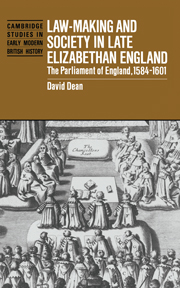Book contents
- Frontmatter
- Contents
- Acknowledgements
- Note to the reader
- List of abbreviations
- Introduction
- 1 Initiation and procedure
- 2 Supply and the general pardon
- 3 The crown and the state
- 4 Religion and the church
- 5 The commonweal
- 6 Law reform
- 7 Private legislation
- 8 Expiring laws continuance acts
- Epilogue: the Parliament of 1604
- Conclusion
- Index of acts
- Index of bills
- General index
Introduction
Published online by Cambridge University Press: 14 September 2009
- Frontmatter
- Contents
- Acknowledgements
- Note to the reader
- List of abbreviations
- Introduction
- 1 Initiation and procedure
- 2 Supply and the general pardon
- 3 The crown and the state
- 4 Religion and the church
- 5 The commonweal
- 6 Law reform
- 7 Private legislation
- 8 Expiring laws continuance acts
- Epilogue: the Parliament of 1604
- Conclusion
- Index of acts
- Index of bills
- General index
Summary
The purpose of this book is not to revise the story told by Sir John Neale in the second volume of his epic Elizabeth I and her Parliaments, but to recover the history of the bills and acts which he ignored. Neale's history of the Queen and her parliaments necessarily focused on episodes of conflict, confrontation and opposition because he wanted to ‘reveal the significance of the Elizabethan period in the constitutional evolution of England’ and, specifically, ‘to banish the old illusion that early-Stuart Parliaments had few roots in the sixteenth century’. His particular contribution was to identify an organised puritan opposition who wanted to ‘frame the agenda of Parliament’ and ‘taught the House of Commons … the art of opposition’.
Although this concentration on conflict and opposition reclaimed much for the history of Elizabethan parliaments, it also led to a distortion. Neale was not interested in the daily parliamentary business of making laws unless a bill created a major problem in the tripartite relationship of Queen, Lords and Commons. What contemporaries would have regarded as both unusual and unfortunate, Neale saw as the hallmarks of a developing institution. And what they saw as the essential business of parliament, he largely ignored. Of some 600 measures initiated in the six parliaments held between 1584 and 1601, Neale discussed less than fifty.
Nevertheless, the historian interested in legislation owes an enormous debt to Neale for he, and those working with him, discovered a large number of previously unknown sources for Elizabeth's parliaments.
- Type
- Chapter
- Information
- Law-Making and Society in Late Elizabethan EnglandThe Parliament of England, 1584–1601, pp. 1 - 4Publisher: Cambridge University PressPrint publication year: 1996

